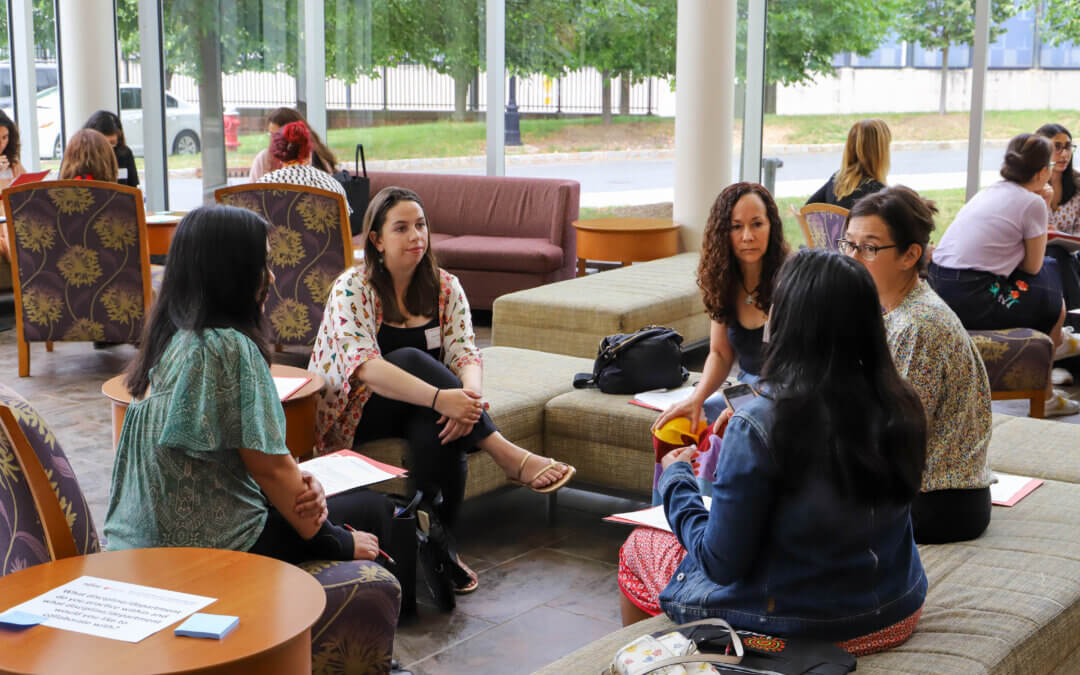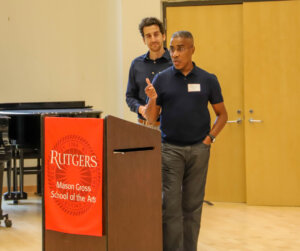
Rutgers community members, including faculty, staff, and students from across the university, came together on June 20 to participate in a planning session for the newly created Arts in Health Research Lab, a collaboration between Mason Gross School of the Arts (MGSA), Rutgers School of Public Health (SPH), and the New Jersey Performing Arts Center (NJPAC).
The full-day workshop, which drew nearly 75 participants, aimed to explore both trends in research and areas of shared interest in the emerging arts in health field as well as clarify the mission of the Arts in Health Research Lab and lay groundwork for next steps in collaboration. Multiple breakout sessions were held throughout the day to gather feedback that will help shape the direction of the lab, which will support arts-integrated research and will engage Rutgers students in developing research and leadership skills as they explore the health benefits of interacting with the arts.
 Presentations during the event outlined research projects and programming conducted at both Rutgers and NJPAC, including three initiatives co-authored by Mason Gross and School of Public Health faculty that are funded by MGSA-SPH Collaborative Seed Grants: Frederick Curry and Devin English spoke about their forthcoming research into the positive mental health effects of Polestar Pilates in New Jersey high schools; Jeff Friedman and Kristen Krause explained their findings about an oral history workshop for people living with HIV/AIDS; and Jacqueline Thaw shared images and feedback from the Photovoice project (co-authored with Ashley Grosso), which aims to reduce stigma faced by LGBTQ+ individuals that may prevent them from seeking healthcare.
Presentations during the event outlined research projects and programming conducted at both Rutgers and NJPAC, including three initiatives co-authored by Mason Gross and School of Public Health faculty that are funded by MGSA-SPH Collaborative Seed Grants: Frederick Curry and Devin English spoke about their forthcoming research into the positive mental health effects of Polestar Pilates in New Jersey high schools; Jeff Friedman and Kristen Krause explained their findings about an oral history workshop for people living with HIV/AIDS; and Jacqueline Thaw shared images and feedback from the Photovoice project (co-authored with Ashley Grosso), which aims to reduce stigma faced by LGBTQ+ individuals that may prevent them from seeking healthcare.
The projects illustrated the overarching theme of the day: that arts and health go hand-in-hand, both professionally and for the public good.
“Health happens in communities,” explained Jill Sonke, director of research initiatives in the Center for Arts in Medicine at the University of Florida and co-director of its EpiArts Lab, which explores the impact of arts and cultural engagement on population health outcomes. “Access to the arts and social and cultural activities is a social determinant of better health, and is an available health resource in our communities.”
Sonke’s presentation was supported by NJPAC, which collaborated with SPH and MGSA in planning and running the day’s activities.
The Arts in Health Research Lab is described by the partnering organizations as a first-of-its-kind collaboration between a university arts school, a school of public health, and a performing arts center.
“This event embodied the cross-disciplinary ethos of the lab and of the Rutgers School of Public Health,” says Perry N. Halkitis, dean of the Rutgers School of Public Health. “Rutgers faculty, students, and staff engaged in interactive and modern conversations about health— recognizing that the arts often lead the way. If we are to advance the wellbeing of people and populations, we must work in a space that recognizes that health must be understood as a biopsychosocial phenomenon and not as a purely biomedical one. As a leading school of public health, we are innovating and are informed by the social justice tenet that defines our school.”
The workshop also included an introduction to the power of collaboration, presented by Mason Gross faculty Scott Ordway, who developed and implemented the interactive “Interplay” course for first-year arts students to connect and build relationships as they arrive at Rutgers.
Mason Gross doctoral student Laura Palm, who is earning a DMA in viola performance to add to her medical degree, was eager to sign up for the workshop and sees the “huge potential that Rutgers has to create great collaborations and meaningful research in this field,” she says.
“I am a strong believer in collaboration between different departments because everybody has a unique background, areas of expertise, and visions for their scientific field,” says Palm, who plans to become a doctor specializing in treating injuries specific to musicians. “There is so much overlap between fields of research and interests and we can only benefit from this synergy.”
Ideas and reflections from participants were collected throughout the day, including challenges that both fields face such as acknowledging the importance of arts access and funding, understanding the long-term value and impact of arts and health initiatives beyond research, and recognizing barriers to participation for both professionals and community members.
As the new lab develops its arts in health research projects, the focus will be on benefiting populations across New Jersey and will assess the health impact of MGSA and NJPAC’s productions and programs.
“This initiative epitomizes the purpose of a research university—the arts offers us unique insight into what it means to be human, and science can quantify that,” remarked Mason Gross Dean Jason Geary. “The Arts in Health Research Lab will allow us to work with and engage our community and has enormous potential to reshape the landscape at Rutgers, across the state, and around the world.”
Learn more about the Arts in Health Research Lab.
Top image: Workshop participants in a breakout session. Bottom image: Mason Gross Dance faculty member Frederick Curry (right) and Rutgers School of Public Health faculty member Devin English.
Photos by Alec Fray.

